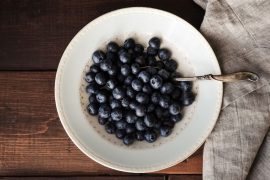After childbirth, new mums begin a new stage in their lives: the postpartum period or what we sometimes call “the fourth trimester”. This is a period that is important not only to establish the breastfeeding process and bond with our babies, but also because it is the time to recover from labour, to heal our tissues and aim to return to the weight we used to be before pregnancy.
Despite our current (scientific) knowledge about how diet affects the quality of breast milk, there’s still some controversy and misconception about this topic. Some may say that it doesn’t matter what mums eat, breast milk composition is fixed, and it won’t change. Some mums might also feel a lot of pressure with the need to eat perfectly in order to make good quality milk, and in the end, this fear might be one of the reasons that women stop nursing their babies.
The concept of breastfeeding nutrition is that mums don’t need to follow a perfect diet all the time – a mum will still produce quality breast milk. However, the nutritional composition does change based on a mother’s nutrient stores and diet. So, by aiming to eat a nutrient-dense diet, a mum will automatically optimise her nutrient intake and stores, which in turn supply the nutrients needed for babies. It will also ensure mothers have the proper building blocks to recover from labour for future pregnancies, and prevent other health issues later on in life.

Losing weight while breastfeeding
Like many mums, getting back to your pre-pregnancy weight after childbirth is tough sometimes. There are so many things going on during this stage that paying attention to what you eat and trying to achieve a normal weight takes second place.
However, it is important to return to your ideal weight, especially if you gained more weight during those previous months than recommended, or if you were already overweight before getting pregnant. Post-partum weight retention is a risk factor for future obesity and some chronic diseases such as heart disease, and type 2 diabetes. Likewise, if you plan to get pregnant again in the future, excess weight puts you at risk for medical complications. For this reason, it is important to pay attention to healthy eating and pelvic floor friendly exercises to help you achieve your weight loss goals and prevent future health issues for you or your child.
So, should I go on a diet as soon as I arrive home?
If you are breastfeeding, it’s best to wait for at least 2-3 months until your breastfeeding supply is well established before trying to lose weight.
Energy and nutrient requirements during breastfeeding are high and can have a negative impact on both you and your baby if they are not met. In contrast, following a well-planned and healthy diet while you are nursing your newborn is important because it will aid with wound healing, restore your nutrient stores, help your breast milk supply and, equally important, it will affect some of the nutritional content of your breast milk.
As mentioned, during breastfeeding, caloric and nutrient requirements are higher than usual, and mums should eat at least 1800 kcal per day. Eating less than this amount can negatively affect breast milk volume; plus, a poor diet with a very low caloric supply might be lacking in essential nutrients and lead to changes in the nutrient composition of the human milk.
Some new diet patterns, such as intermittent fasting, are not advisable because mums need consistent calories, nutrients, and fluids throughout the day to support milk supply and meet their own body’s nutrient requirements. Limiting food and fluids for extended periods of time during the day can lead to reduced milk supply, inadequate nutritional status, low energy levels, and dehydration.











